The cost to treat well water depends on water quality, the volume of water, and the size of the filter you want to install.
Similar Guide: Everything you Need to Know Before Moving to a House with Well Water
Well Water Treatment Costs
The table below mentions the average cost of treating well water.
| Water Quality Test | $20 – $300 |
| Sediment Filter | $40 – $300 |
| Water Softener (salt-based) | $600 – $3000 |
| Water Softener (salt free) | $150 – $2000 |
| Iron Filter | $600 – $2500 |
| Acid Neutralizer | $500 – $3000 |
| Reverse Osmosis Filter | $200 – $2000 |
| UV Purification System | $500 – $2000 |
| Whole House Water Filter | $200 – $5000 |
| Shock Chlorination | $50 – $500 |
Water Quality Test
A water quality test identifies the contaminants and their concentration in well water. It is critical for installing or upgrading water treatment systems. A home test may cost you as low as 20 bucks but high-end labs may charge up to 300 dollars.
Pre-Sediment Filter
A sediment filter captures large particles in well water. It is often installed before a water softener or whole house water filter to extend their cartridge life and improve performance. Some people also install a sediment filter before a pressure tank to prevent large sediment from reaching the tank. Depending on various factors, a typical sediment filter costs $40-$300.
Pre-sediment filters for well water often have a micron rating from 30 to 500 microns. You must select the sediment filter’s micron rating after conducting a water test.
The cost depends on the sediment rating, maximum flow rate, build quality, cartridge size, flushing mechanism (programmed or manual), cartridge life, and housing material. Filters with WQA and NSF/ANSI certification are costly.
The cost-to-benefit ratio of a sediment filter manifests itself via longer cartridge life of other filters in your home. It also prevents sediment from entering the plumbing system.
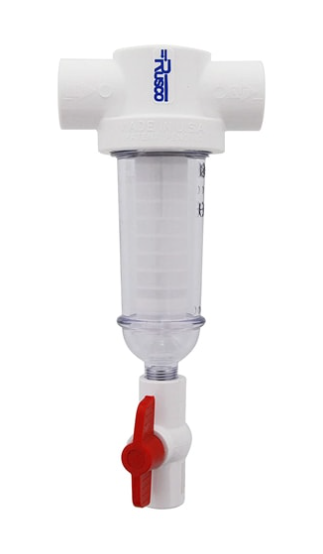
The 1-inch spin-down has a 100-micron mesh screen that is perfect for catching sediment, debris, leaves, hair, sand, dust, and gravel from well water. The unit delivers up to 25 GPM flow rate to provide enough water for filters to perform effectively.
The transparent housing shows accumulated sediment, so you can timely clean the filter. It comes with a flush valve to remove the gunk inside. The filter mesh lasts for two years. This unit isn’t flashy, but it offers value for money. It is durable, rugged, and meant to last long.
Water Softener (Salt-Based)
A salt-based water softener costs $600 – $3000 depending on its ability to remove hardness. Most softeners have a control head that controls salt setting and regeneration schedule. Other factors include build quality, system size, warranty, and grain capacity.
The cost-to-benefit ratio of installing a water softener is impressive. It protects your costly appliances, plumbing fixtures, skin, and hair.
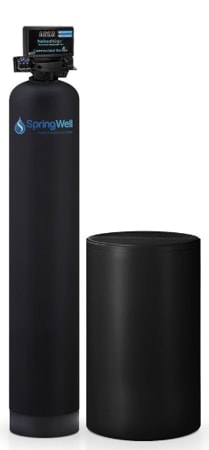
SpringWell’s salt-based water softener is a reliable ion-exchange system. It makes extremely hard water soft and fit to use, resulting in 40% less detergent use, better water flow, healthier skin and hair, and longer life of your appliances.
The system comes with a Bluetooth control head, a separate brine tank, an installation kit, and a lifetime warranty. The system provides a 20 GPM flow rate for a 7-bathroom house.
Water Softener (Salt-free)
Salt-free softener or water conditioner costs $150 to $1500. The price varies based on size, working capacity, warranty and flow rate.
Salt-free water softeners don’t add or remove anything from water and have the luxury of no salt replacement, brine discharge, and regeneration.
The cost-to-benefit ratio is not as impressive as a salt-based water softener. However, it is the only choice for many people as some states have banned salt-based softeners due to environmental concerns.
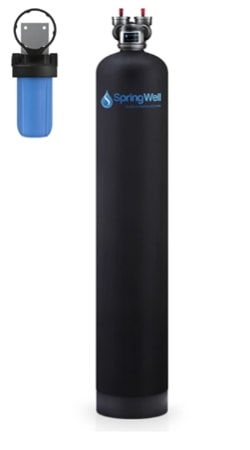
SpringWell’s salt-free water softener is an excellent alternative to the traditional salt-based softener. It prevents 99.6% scale prevention resulting in improved life of your appliances, better skin, and less detergent use.
The system doesn’t waste water, discharge brine, and doesn’t need frequent salt replacement. It comes with a sediment filter, a Bluetooth control head, and all the tools required for installation. The only problem is its inability to handle high levels of hardness in well water.
Iron Filter
Iron filters cost between $600 to $2500, depending on filtration power, size, flow rate, build quality, and warranty. One way to save some bucks while buying an iron filter is to test your well water for iron. This test will reveal the iron concentration in your water. You don’t need a costly iron filter if iron levels are not above 6 PPM.
Some water softeners can remove iron below 6 PPM, and some whole house filters can remove iron up to 3 PPM. So, choose wisely.
The cost-to-benefit ratio of installing a dedicated iron filter is huge. Your water tastes and smells better; there is no scale on appliances, bathtubs, toilets, showers, and faucets.
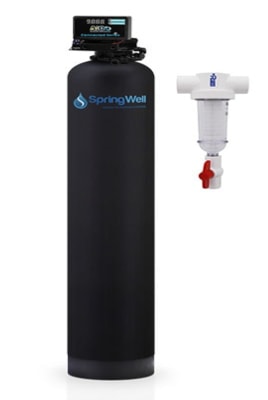
It is a perfect solution for a private well. The unit can remove up to 7 PPM iron, 8 PPM hydrogen sulfide, and 1 PPM manganese. The unit requires no maintenance and can be programmed to daily backwash or metered to remove the accumulated contaminants, replenish the filter media, and refresh the air pocket.
The unit works by oxidizing the contaminants in the well water. The contaminants are then captured by the filtration media to be removed later. Overall, it is a high-end unit with low maintenance and downtime.
Acid Neutralizer
The cost varies between $500 to $3000 depending on the size of the unit and how much acidity it can remove. Some acid neutralizers are a part of multi-stage water filtration systems that are even more expensive.
The cost-to-benefit ratio is excellent. Acidic water is bad for your health, plumbing, and appliances. It can corrode your costly appliances. The only alternative to installing an acid neutralizer is digging a new well or converting to city water.
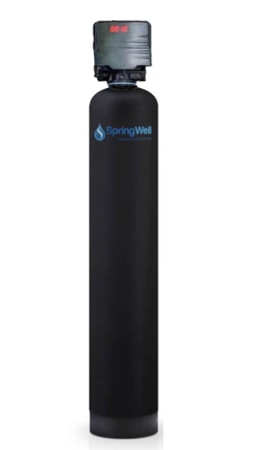
The unit can handle acidic water with a pH range of 6.0 to 6.5. It is an effective and powerful unit but will only give good results if the pH is in the mentioned range. The unit comes with a lifetime warranty on tanks and valves.
You can customize the system by adding a UV water purification or whole-house water filter system.
Reverse Osmosis Filter
RO filters cost $200 to $2000, depending on size and filtration capabilities. You can find an under-sink filter with 5 filtration stages or one with 11 filtration stages. Countertop RO dispensers are also available for small homes and people using city water.
A typical RO filter consists of a sediment filter, two carbon filters, an RO membrane, and one post-carbon filter for taste improvement. Some models also feature a UV purifier and a remineralization stage.
The cost-to-benefit ratio is amazing. You don’t need to buy bottled water anymore. Not only do you get healthy drinking water, but you also save a lot of plastic bottles going to landfills. RO filters waste 1-3 gallons of water for every gallon they filter. So, you may want to consider this if you are using city water.
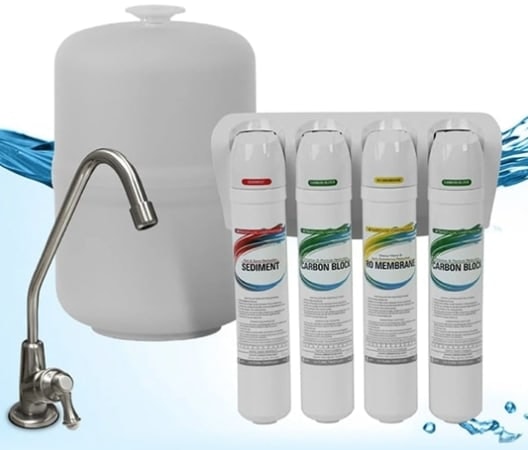
SpringWell’s RO system consists of one sediment filter, two carbon filters, and a RO membrane to remove up to 99.9% of all contaminants in well water. It is more costly than other RO systems but more reliable.
You can get up to 75 gallons of filtered water daily. It comes with a pressurized tank to store filtered water. The system is easy to install and comes with a 100% lead-free spigot.
UV Purification System
A UV purification system costs $500 to $2000. It is used to kill bacteria, viruses, and microorganisms in water. You can also achieve this by shock chlorination or installing a chlorinator, but these methods adds chlorine smell and taste to water.
A UV purifier works by destroying microorganisms’ ability to reproduce, but it needs a sediment filter to function properly.
A typical UV purifier is a standalone system, but it is also found as a part of a multi-stage whole house or under sink water filter.
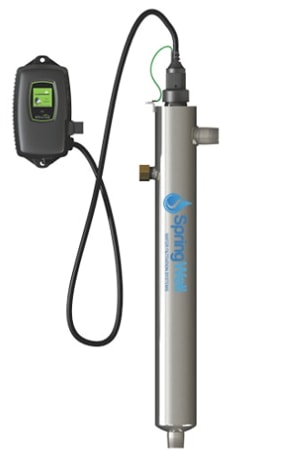
SpringWell’s UV purification system kills up to 99.9% of bacteria, viruses, and other microorganisms in well water. The unit has a digital control head to indicate the time left to replace the UV bulb.
It is easy to install and can be paired with SpringWell’s or other whole-house water filtration systems.
Whole House Water Filter
A whole house water filter is usually installed after a sediment filter, water softener, or acid neutralizer, but before the plumbing system.
Many well owners prefer installing a whole house system because it can filter your entire home’s water supply. Moreover, the latest models can be customized based on your needs. In some high-end units, you can add a UV purifier, water softener, iron filter, carbon filter, or even a RO membrane.
A whole house filter can cost between $200 to $5000 depending on what contaminants it can remove, cartridge life, and flow rate.
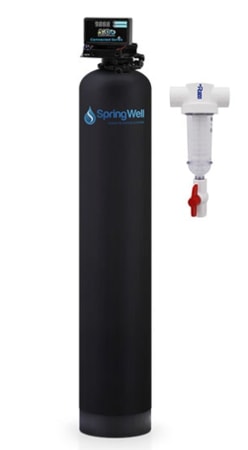
SpringWell offers one of the best whole-house water filtration systems. The filter can remove up to 7 PPM iron, 8 PPM hydrogen sulfide, and 1 PPM manganese.
The unit comes with a sediment filter to remove large particles in water. You can select a 12 GPM or 20 GPM variant based on your requirements. It is an air-injection filter and is 100% septic safe.
SpringWell also offers to upgrade the system to add an RO filter, UV purification, and a salt-based water softener.
Shock Chlorination
Shock chlorination is the process of disinfecting well water using household bleach. The project can cost $50 to $500 depending on the well depth, diameter, and amount of water in your well.
The cost-to-benefit ratio for shock chlorination is outstanding. Chlorinating a water well may save you from investing in a UV or RO filter. You’ll need a carbon filter to remove chlorine taste & smell from water.
You can also use a chlorinator for wells with a recurrent bacterial contamination problem. A chlorinator requires a powerful carbon filter to remove chlorine smell and taste from well water.
SpringWell’s chemical injection system is best for killing iron bacteria, viruses, protozoa, and other microorganisms in well water. The added benefit of installing this unit is that it also oxidizes iron, sulfur, and manganese that may be present in well water.
The unit requires periodic bleach and water addition. The system comes with a control head for easy management.
Well Water Filters Maintenance Costs
All water filters need periodic replacement. It is important to consider maintenance costs before buying a well water filter. A costly filter has fewer maintenance needs because it has durable cartridges that last longer. On the flip side, cheap filters need frequent cartridge replacement because their cartridges don’t last long.
Moreover, water quality and usage also impact cartridge replacement frequency. Sometimes adding a pre-sediment filter increases filter life, reducing maintenance costs.
